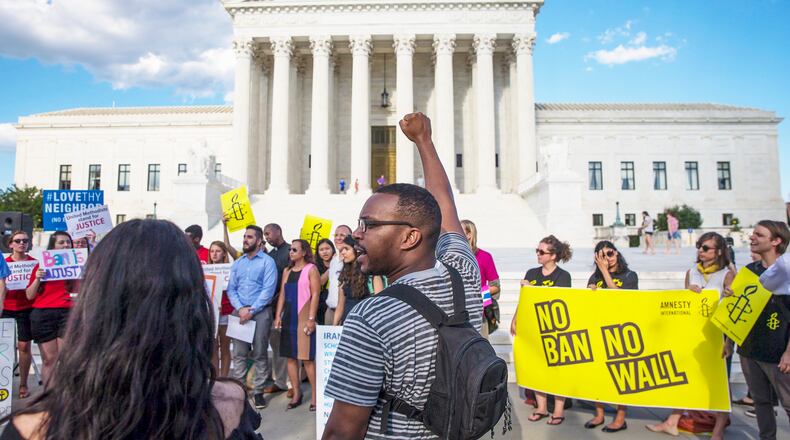The Trump administration’s travel ban suffered another legal setback Wednesday when the U.S. Supreme Court sided with a federal judge in Hawaii, temporarily exempting grandparents and other extended family members from the directive.
But in a win for President Donald Trump, the high court’s 6-3 order also puts on hold U.S. District Court Judge Derrick Watson’s other exemption for refugees, pending a decision by the 9th Circuit Court of Appeals. Justices Clarence Thomas, Samuel Alito and Neil Gorsuch said they would have stayed all of the exemptions ordered by Watson.
Last month, the Supreme Court reinstated key parts of Trump’s revised travel ban while agreeing to hear legal challenges to his executive order in October. In its ruling, the high court partially granted the Trump administration's request to lift preliminary injunctions against the directive and let it block visitors from six Muslim-majority countries for 90 days, freeze the nation's refugee resettlement program for 120 days and limit the number of refugees who may be brought here this fiscal year to 50,000, down from about 85,000 the year before. (The 50,000-cap has already been reached.)
But the court said those restrictions cannot be applied to people with a "bona fide relationship with a person or entity in the United States.” The court also used the phrase “close familial relationship.” The Trump administration defined such relationships to include a parent -– including a parent-in-law -- spouse, child, adult son or adult daughter, son-in-law, daughter-in-law or sibling. This includes step relationships. Not included were grandparents, grandchildren, aunts, uncles, nieces, nephews, cousins, brothers-in-law, sisters-in-law and any other “extended family members.”
In a 26-page ruling issued last week, Watson, a President Barack Obama appointee, ordered exemptions for travelers with grandparents, grandchildren, brothers-in-law, sisters-in-law, aunts, uncles, nieces, nephews and cousins in the U.S. Refugees who have been given a “formal assurance” from a resettlement agency in the U.S. were also exempt under Watson’s order.
“Common sense, for instance, dictates that close family members be
defined to include grandparents,” Watson wrote in his order. “Indeed, grandparents are the epitome of close family members. The government’s definition excludes them. That simply cannot be.”
Watson ruled after the state of Hawaii challenged the Trump administration’s travel restrictions. The U.S. Justice Department, which sough clarification from the Supreme Court, had no immediate comment Friday. But U.S. Attorney General Jeff Sessions issued a statement last week, blasting Watson’s ruling.
“The district court has issued decisions that are entrusted to the executive branch, undermined national security, delayed necessary action, created confusion, and violated a proper respect for separation of powers,” he said. “The Supreme Court has had to correct this lower court once, and we will now reluctantly return directly to the Supreme Court to again vindicate the rule of law and the executive branch's duty to protect the nation.”
About the Author
Keep Reading
The Latest
Featured



